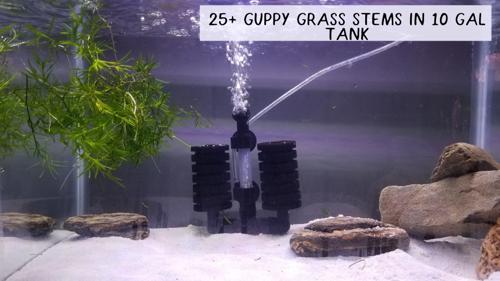Home > Live Plants > Floaters
3+ Guppy Grass Stems *USA Home Grown*
Guppy Grass
Najas guadalupensis
Tank Requirements and Water Parameters
Tank size:
Guppy Grass can be grown in a variety of tanks; including nano aquariums, but is best cultivated in a tank of at least 10 gallons.
Water type, Temperature, Hardness, and pH:
Temperature:
The ideal water temperature for growing Guppy Grass is between the range of 19 – 28 °C (66 – 82 °F).
pH:
The optimal pH level for Guppy Grass is between 5 – 7.
Hardness:
Guppy Grass is a resilient plant, it will thrive in soft – hard water: 5 – 8 KH.
Lighting:
In most cases, high lighting causes more compact, bushier growth. medium light will cause upward growth with longer distance between the leaf nodes. Too high of lighting will result in brown/red stems and leaves.
To promote optimal growth and ideal coloration in Guppy Grass, maintain lighting for up to 10-12 hours daily.
Substrate:
Guppy Grass can grow in any substrate, including sand and gravel. It does not require a nutrient-rich substrate.
CO2 and Fertilization:
CO2 supplementation for Guppy Grass is not required. This aquatic plant grows well in low-tech tanks.
CO2 supplementation will promote dense growth, spurs the growth rate, and facilitates pearling.
Fertilizers are essential nourishment for Guppy Grass. Fertilization assists in optimal condition and encourages the steady growth of shoots.
Guppy Grass is mostly a water column feeder plant; the root system is pretty weak. Water column feeders, like Guppy Grass, absorb nutrients primarily through its leaves. Meaning, you need to dose liquid fertilizers.
Care and Maintenance of Guppy Grass
Care and maintenance of Guppy Grass is highly dependent on nutrient availability, the intensity of lighting, and if CO2 supplementation is used.
Growth Rate:
This aquarium plant will experience a period of slow growth while adapting to tank conditions. After this period of dormancy and with good conditions the plant will flourish, requiring frequent prunings. One plant is able to fill a small aquarium in 2-3 months.
Trimming:
Without regular pruning, the plant will grow quite bushy and that’s good for the mid-ground/ background. A semi-regular pruning can help train the plant to keep the desired shape.
As a foreground plant, the shoots will require constant and aggressive pruning to maintain a short and compact form. Heavy trimmings promote dense growth and formation of side shoots.
The bottom line is to cultivate and prune the foliage into the form or shape you desire in your aquarium.
Planting and Propagation of Guppy Grass
Like most stem plants, Guppy Grass may be planted by placing the healthy stems into a substrate. Split the plant into several portions and plant them in the substrate using a pair of aquarium tweezers.
Guppy Grass can be used as a floater to create shade, while some grow it as a carpet, and others layer it to create depth.
A surefire method for Guppy Grass propagation is to cut mature stems in half and place or float the newly cut stems.
Problems Associated with Guppy Grass
Yellowing leaves: Guppy Grass is highly dependent on nutrient availability in the water column.
Benefits of Guppy Grass
Aquascape: Guppy Grass has a tendency to over grow other plants and will require frequent pruning.
Versatility: Guppy Grass looks good as a background and floating plant.
Removal of excess nutrients: If you struggle with nitrates, Guppy Grass will help you out. This plant absorbs and utilizes harmful chemicals that are emitted from fish waste, decayed plant matter, and tap water such as nitrates, ammonia, and phosphates.
Movability: Once planted Guppy Grass can be easily moved or removed.
Hiding place: It serves as a perfect hiding place for shrimp and fish.
Foraging place: Acts as a buffet of biofilm, which is an ideal first food for newly hatched fry and shrimplets.
Oxygenation: Guppy Grass oxygenates and aerates the tank water.
Quarantine Guppy Grass
Before planting, make sure to disinfect the stems in a bleach solution to eliminate pest snails, algae, and parasites that can wreak havoc in the tank.
*Note for all freshwater plant purchases.
All of our plants are grown submersed in a natural aquatic environment. Which includes fish, shrimp, and snails as tank mates. We do not guarantee our plants are snail free. In our opinion, snails are a vital addition to a complete aquatic ecosystem.
Current Price: $9.99
Stock Level: 18
Store Name: Bishop Aquatics
Store Rating:
Seller Location: Arizona, United States
Shipping: Please review checkout for final shipping options based on items selected, quantity, and groupings.
- USPS Standard : Fits 4 for $0.00
- USPS Priority : Fits 4 for $25.00
Home > Live Plants > Floaters




